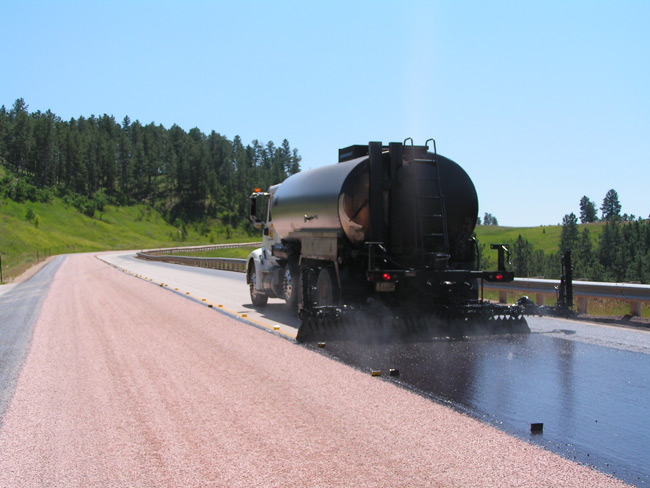Chip Seal
 Chip sealing is the most common form of asphalt preservation on highways, county roads and municipal applications.
Chip sealing is the most common form of asphalt preservation on highways, county roads and municipal applications.
In the right applications and when applied correctly, a chip seal produces a very durable surface which can stand up to high traffic levels and provides a new wear surface on the existing asphalt.
Our Process
A typical chip seal is performed by shooting a layer of emulsified oil on the existing surface, covering it with a well graded aggregate, and then embedding the aggregate in the oil by rolling it with a rubber wheeled roller.
Typically we use 3/8″ chips. These chips must be very clean and preferably damp. Clean damp chips will adhere better to the underlying oil. Once they are spread on the surface, a roller embeds them into the oil for optimal chip retention. This assures a good adhesion that will last for years. A good chip seal should last for 8 years or more. Hardrives uses state-of-the-art chip sealing equipment for spreading the chips. This machine can spread a mat of chips anywhere from 10’ to 20’ in width and with great control. Quality equipment is just another means of assuring that you get a quality chip seal.
In the right application chip seals are a great means of preserving asphalt.
 It is utilized most extensively on city streets, county roads or highways. These are the applications for which it is best suited. Chip seals do not work especially well where there is a lot of sharp turning involved. Sharp turns will tend to pop the chips loose resulting in patches of exposed oil.
It is utilized most extensively on city streets, county roads or highways. These are the applications for which it is best suited. Chip seals do not work especially well where there is a lot of sharp turning involved. Sharp turns will tend to pop the chips loose resulting in patches of exposed oil.
During the heat of summer, these patches can become soft and “bleed”, resulting in oil which can be tracked into stores or homes. For this reason, chip seals are generally not used on parking lots or driveways. A Sealcoat or Slurry Seal are much better options.



